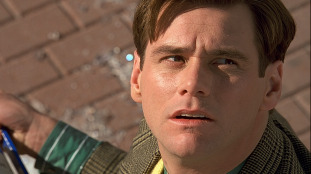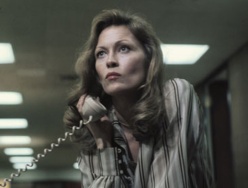Be afraid of television. Be very, very afraid.
Sidney Lumet’s Network and Peter Weir’s The Truman Show must use the same crystal ball, because both have looked into the future of television and both come to that very conclusion.
The question is, what should we be more afraid of – network news programs or reality shows? Well, that depends on how cynical you are.
Of the two films, The Truman Show takes the softer approach, apparently understanding the value of delivering its medicine with a spoonful of sugar. Truman Burbank (Jim Carrey) is a congenial insurance salesman who has apparently never left his hometown of Seahaven Island and doesn’t know he’s been the star of a 24-hours-a-day, seven-days-a-week reality show about his life since before he was born. Despite intricately coordinated efforts to keep him oblivious by the show’s creator/director Christof (Ed Harris) and the actors who play Truman’s family and friends, Truman begins to notice the oddities of his life and embarks on a mission to find out the truth.
Many will view the film as a comedy, and rightly so. Carrey is his usual wily self, if not a bit toned-down, and draws laughs when the increasingly suspicious and erratic Truman goes to more extreme lengths to test the boundaries of his world. “Somebody help me, I’m being spontaneous!” he screeches in one scene, driving his panicked wife (Laura Linney) around and around in circles. Who else but Carrey could make a man so unhinged so very loveable at the same time?
Though the idea that a person of normal intelligence lived for 30 years completely unaware that his hometown is a television set and his life carefully constructed by others could seem either absurd or terrifying in less capable hands, Weir and writer Andrew Niccol strike an ideal balance between logic and fantasy. While Truman’s entirely plausible fear of water after his father’s death in a boating accident (orchestrated by Christof, of course) makes his tiny world believable, clues of how the show is produced remind us that this isn’t 1984. It’s okay to laugh when a set light falls out of the sky at Truman’s feet, or when a traffic jam appears out of thin air to stop Truman from driving away.
With such a rich, imaginative premise, Weir understandably tends to get carried away by the cleverness of his material, focusing on the mechanics of the highly advanced soundstage that holds Seahaven and the expertly orchestrated production of “The Truman Show” when he could be fleshing out the film’s point of view. It’s never clear what the audience-within-the-film’s attitude is toward the grave injustices done to Truman; they alternate between careless indifference and cheering for his discovery of the truth. And while Christof claims that the world he created for Truman allowed him to lead a more “normal” life, the film clearly condemns him for playing God. In the end, we’re not sure who to blame, the audience or producer, and The Truman Show loses a bit of its edge.
Network, on the other hand, knows exactly who’s at fault for the fate of its exploited television star: the networks and the ratings-hungry people who run them. When veteran news anchor Howard Beale (Peter Finch) gets his two weeks’ notice, he rants live on the air, unwittingly sparking a media frenzy and higher viewership than ever before. Network executives Diana Christensen (Faye Dunaway) and Frank Hackett (Robert Duvall) leap to keep the now-folk hero but volatile Beale on television; that is, as long as his ratings make him worthwhile.
While there’s plenty of humor to be found here, Network does not have the luxury of working from a high-concept conceit, like The Truman Show, to assure us that it’s all just make-believe. On the contrary, everything that happens at fictional network UBS has either already happened, is on its way to happening, or may very likely happen in the future in real life. What network hasn’t turned the day’s headlines into a television series? How many television stars exist whose instability and mental fragility make for can’t-miss programming? Hundreds of Diana Christensens must stalk the halls of the networks’ offices, obsessing about deals and viewership even while lovemaking and admitting, “All I want out of life is a 30 share and a 20 rating.”
Network trades The Truman Show’s broad humor and inventive energy for nondescript studio sets and closed-door confrontations, but it gains in return a greater sense of relevance – the dreadful feeling that the fate of Howard Beale is the logical next step in our own very real world of “bigger is better.” Consider the eerie calmness of the executives as they discuss how to remove Beale from the air, or the indifference with which they treat the real-life crimes that form the basis of another project – a collaboration with a terrorist group. Not that The Truman Show isn’t also chilling in many respects – a scene in which Truman’s “best friend” Marlon professes his devotion to Truman through lines fed to him by Christof is particularly heartbreaking – but Network’s focus on companies and characters that in many ways already exist makes its message far more effective.
Proponents of reality television may argue that Network’s scenario is more likely to come to life, and those who believe in the news media may say the same about The Truman Show. It doesn’t matter. What we ought to be afraid of is the possibility that when it happens, we won’t change the channel.


